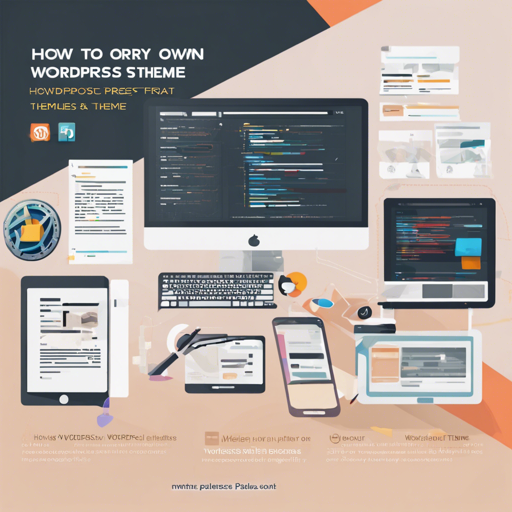If you’ve dabbled in HTML, CSS, and JavaScript, you might find yourself at a crossroads when faced with the powerful CMS that is WordPress. Whether you’re building sites for clients or simply want to expand your skill set, crafting a custom theme is a fantastic venture. In this guide, we’ll navigate through the process of creating your very own WordPress theme from scratch, making it user-friendly and accessible regardless of your previous experience with WordPress.
Prerequisites
- A website (can be any website)
- Familiarity with HTML, CSS, and JavaScript
- Basic understanding of setting up a local server environment
Don’t worry if you lack PHP knowledge; we won’t be diving into that just yet! If you need help setting up your local server environment, check out this short article.
Goals of This Tutorial
- Install WordPress locally
- Convert an existing HTML website (e.g., one based on Bootstrap) into a custom WordPress theme
- Migrate WordPress to a live server
Topics Covered
- Understanding WordPress capabilities
- Design creation
- WordPress installation
- Custom theme creation
- Blog post creation
- Page creation
- Pagination and comments integration
- Function usage
- Custom post types creation
- Migrating WordPress
Understanding the Structure of Your Theme
When creating a WordPress theme, it’s helpful to visualize its structure as a blueprint of a house. Here’s how:
- Header (header.php): The entryway of your house that greets visitors.
- Footer (footer.php): The foundation that supports the entire structure.
- Content (content.php): The rooms where all the activity happens.
- Sidebar (sidebar.php): The hallway that provides additional navigation options.
- Single Post (single.php): The living room, showcasing individual stories.
- Page (page.php): The various rooms for different purposes.
- Index (index.html): The overall layout of your home.
- Comments (comments.php): The discussions taking place around the dinner table.
- Functions (functions.php): The plumbing that makes everything work smoothly.
The Loop
The Loop is where WordPress fetches and displays your content. Think of it as the conveyor belt in a factory, bringing in posts, pages, comments, and custom post types in an organized manner to keep your production line (website) running efficiently.
Functions to Explore
- Using functions.php effectively
- Properly enqueueing styles and scripts
- Including featured images
- Embedding WordPress titles correctly
- Creating custom global settings fields
- Defining custom post types
Summary Steps
- Install a local server with WAMP
- Turn a custom Bootstrap website into a WordPress theme
- Expand your WordPress theme with comments and more
- Migrate WordPress to a live server
- Add custom metaboxes to your WordPress theme
Troubleshooting
If you encounter any challenges while establishing your WordPress theme, here are a few troubleshooting tips:
- Check your file paths for proper linking of CSS and JS files.
- Ensure that your local environment is set up correctly before attempting to install WordPress.
- Review WordPress documentation for specific functions and features you may not understand.
- Consider reaching out to community forums for help with unique issues.
For more insights, updates, or to collaborate on AI development projects, stay connected with fxis.ai.
At fxis.ai, we believe that such advancements are crucial for the future of AI, as they enable more comprehensive and effective solutions. Our team is continually exploring new methodologies to push the envelope in artificial intelligence, ensuring that our clients benefit from the latest technological innovations.

